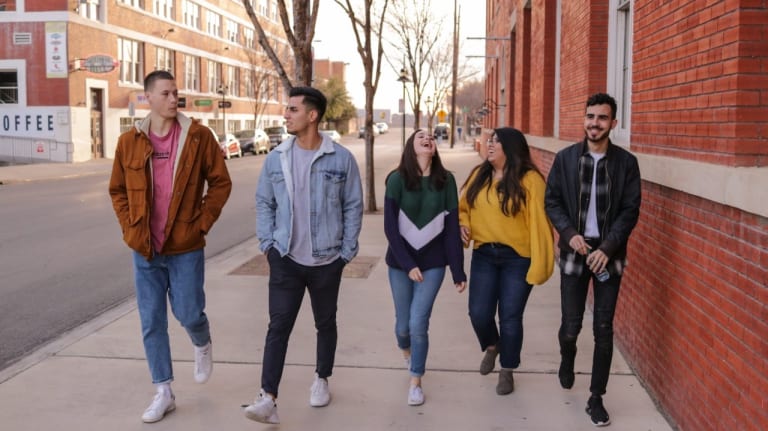When we think about loneliness, certain stereotypes come to mind; chances are, you’re picturing a solitary person who spends a lot of time alone. But the truth is, you could be in a crowded room, supposedly having a great night out with friends, and still feel lonely. And it turns out, the people who are feeling the most lonely are in the places where there is extreme potential for connection- college campuses. So why do 30% of college students reported feeling “very lonely” within the last two weeks? What does loneliness in college look like?
This past year, we talked to first-year college students across the country and heard their stories. We talked to freshmen at Elon University about the anxiety of texting someone to hang out and showing interest in being friends. We spoke to students at the University of Oregon about the struggle of small talk and the desire to fast track to deeper conversations. We heard from some students that they just wanted to be part of a group of friends, and from others that even though they had a group, they didn’t feel this group really knew them.
From these stories, we created personas to help us remember, months later, when we’re deep in wireframing or writing content for a digital tool to reduce loneliness – who are we designing for. These are the four personas of our project:
Anxious Socializer
Anton came to college really wanting to make friends. In the beginning, he went all out, going to different club meetings and spending time with his hallmates. He tends to overthink interactions and is hard on himself when they don’t go the way he wanted. At the end of the semester, he feels burnt out and disappointed that he hasn’t found his group yet.
“I meet people, but it never ends up working out. The first thought is that I’m doing something wrong? Is there something about my personality? Is there a lack of follow through on my part? Creating relationships is really, really hard for me. I worry that I’m not connecting with enough people, and then I worry that I’m not connecting deeply enough with some people.”
***
Waiting for the Magic
Steph never had to make her own friends; growing up, her friends naturally gravitated toward her with little effort on her part. Making small talk with hallmates feels shallow and exhausting to her, and she wants deeper conversations with people more like her. She spends a lot of her time studying or going to on-campus clubs that are good for her career, but even as she says she’s too busy, she really wishes that someone would reach out and befriend her.
“People used to ask me to hang out, but they’re not close, just acquaintances. I turn them down because I have too much homework and I can’t go to parties, I could get expelled. So they stopped trying. People are not trying to be close and talk to me. I want to reach out, but I want them to reach out to me.”
***
Suddenly Unsure
Luke was certain of his place in high school; he was the band leader, the valedictorian, the adventure seeker. In college, he feels like a small fish in a big pond, and without his role and the social order of high school, he’s suddenly unsure of himself and how to relate to other people.
“There were 1,000 people in my hometown, one stoplight. At home, I was like a big fish in a small pond, and here, I’m like a small fish in a big pond. Instantly, I felt like I was a nobody. Right off the bat, I felt like I didn’t fit in and I didn’t stand out in any way. I remember calling my dad and telling him ‘I feel meaningless.’”
***
Secretly Disconnected
Socializing comes easily for Victor; he’s often included in group dinners and invited to parties. He knows how to turn it on [the charm], and he did that a lot in the first couple of months at school. Though he’s surrounded by people, he feels like they just want to party together. For a while, that was fine with him, but after seeing his best friends from home over the holiday break, he wants friends at school who are actually interested in getting to know him, rather than labeling him.
“There are people who I don’t know their names, but they know me because I pulled up to functions, I said hey to everyone. But that’s the problem, people expect that from me. Once I don’t act like that or keep that energy, people are like oh you’re having a bad day. No, I’m just not energetic today, I’m sorry to disappoint you.”
***
These personas call on us to empathize; we can see our own experiences in these stories. They challenge us to think about how we can design for different people and experiences: how can we support students to understand themselves better? How can we encourage them to try connecting with people in new ways? And how can we help them have compassion for themselves when it’s difficult?




